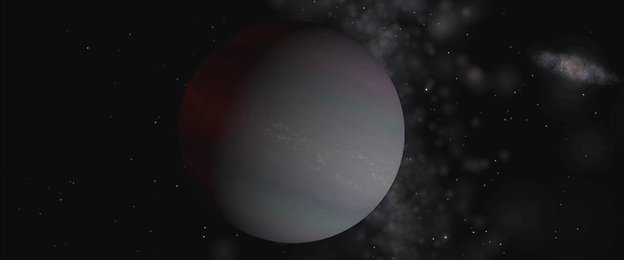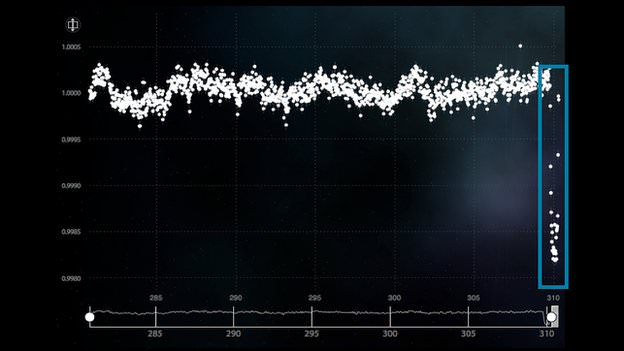- planethunters.org
Welcome to planet hunters.
With your help, we are looking
for planets around other stars
Another zooniverse project
Powered by Kepler public data
Zooniverse: Planet Hunters
Zooniverse: Planet Hunters
Know the quiet place within your heart and touch the rainbow of possibility; be
alive to the gentle breeze of communication, and please stop being such a jerk. — Garrison Keillor
alive to the gentle breeze of communication, and please stop being such a jerk. — Garrison Keillor
Re: Planet Hunters
‘Citizen Science’ and Kepler
Centauri Dreams | 16 Dec 2010
Centauri Dreams | 16 Dec 2010
“With your help, we are looking for planets around other stars.” So begins a first-time user’s introduction to Planet Hunters, an online citizen science project that delivers exactly what many of us have been hoping for since the first Kepler results came in — a chance to use our own computers to help analyze data taken by the mission. Kepler has been in operation for the better part of two years now, accumulating what Yale astronomer Kevin Schawinski calls ‘another mountain of data to sort through.’ What better way to sort than with distributed computing?
Schawinski is a co-founder of Planet Hunters, and was deeply involved in the creation of the successful Galaxy Zoo project several years back. In the latter, the involvement of average citizens in astronomy took off, to the tune of hundreds of thousands of Web users sorting through a million images of galaxies and classifying them. Kepler presents its own challenges, monitoring almost 150,000 stars in the constellations of Cygnus and Lyra. The trick with Kepler is to look for the characteristic dimming of a star that could signify a planetary transit.
From the Planet Hunters site:
Not every star that dims is experiencing a transit, but some are, and our profoundest hope for Kepler is that it will tease out the signature of a planet not so different from our Earth, a small world in an orbit that would keep water liquid at the surface. Planet Hunters draws on the fact that Kepler data are being released into the public domain. It’s not directly tied to the Kepler mission, but should serve as a useful adjunct to what the Kepler team is doing as it sorts through Schawinski’s ‘mountain.’ The more human intelligence on the job, the better.
- NASA’s Kepler spacecraft is one of the most powerful tools in the hunt for extrasolar planets. The Kepler team’s computers are sifting through the data, but we at Planet Hunters are betting that there will be planets which can only be found via the remarkable human ability for pattern recognition.
This is a gamble, a bet if you will, on the ability of humans to beat machines just occasionally. It may be that no new planets are found or that computers have the job down to a fine art. And yet, it’s just possible that you might be the first to know that a star somewhere out there in the Milky Way has a companion, just as our Sun does. Fancy giving it a try?
Not that computers aren’t critical to the work at hand. But another co-founder of Planet Hunters, Yale’s Meg Schwamb, notes what a good set of eyes and human intelligence bring to the data our computers deliver to the desktop:
That’s the great virtue, proven over time, of the Galaxy Zoo project. In the case of Planet Hunters, the method is to answer a series of questions about the light emitted by a particular star over time, its light curve. Such graphs help astronomers identify the dimming caused by a planetary transit. Planet hunter extraordinaire Debra Fischer notes that even with data from an instrument as precise as the Kepler telescope, picking out the transit signal is exceedingly hard. “Planet Hunters is an experiment,” adds Fischer. “We’re looking for the needle in the haystack.”
- “…computers are only good at finding what they’ve been taught to look for, whereas the human brain has the uncanny ability to recognize patterns and immediately pick out what is strange or unique, far beyond what we can teach machines to do.”
Know the quiet place within your heart and touch the rainbow of possibility; be
alive to the gentle breeze of communication, and please stop being such a jerk. — Garrison Keillor
alive to the gentle breeze of communication, and please stop being such a jerk. — Garrison Keillor
Re: Planet Hunters
Having seen it --I started an account at the site. It sure beats playing solitaire. I surely hope it catches on like wildfire!
- neufer
- Vacationer at Tralfamadore
- Posts: 18805
- Joined: Mon Jan 21, 2008 1:57 pm
- Location: Alexandria, Virginia
Re: Planet Hunters
Lt. Aldo Raine: So you're "the Planet Hunter".jaksichj wrote:
Having seen it --I started an account at the site.
It sure beats playing solitaire.
I surely hope it catches on like wildfire!
jaksichj: A detective. A damn good detective. Finding transit features is my specialty so naturally I work for the Zooniverse finding transit features, and yes some of them are planets. But "Planet Hunter"? [reacts in disgust] It's just a name that stuck.
Pfc. Smithson Utivich: Well, you do have to admit, it is catchy.
Art Neuendorffer
UT: British TV Audience Discovers Potential New Planet
British TV Audience Discovers Potential New Planet
Universe Today | Adrian West | 2012 Jan 19
Universe Today | Adrian West | 2012 Jan 19
A public “mass participation” push initiated on a UK television program to find planets beyond our Solar System has had an immediate result! On Monday, January 16, 2012 “BBC Stargazing LIVE” began its first of three nights of television programs live from Jodrell Bank Observatory in the UK. The series was hosted by Professor Brian Cox, comedian Dara O’Briain along with a number of other well known TV personalities, astronomers and scientists. There was even a guest appearance via satellite link from Captain Gene Cernan, the last man on the Moon.
As well as the main TV program, there were numerous local events across the UK and the viewers could “mass participate” in activities such as looking for extra solar planets with the citizen science project, Planethunters.org.
The website hosts data gathered by NASA’s Kepler space telescope, and asks volunteers to sift the information for anything unusual that might have been missed in a computer search. People are especially adept at seeing things that computers do not and the BBC Stargazing Live event was a golden opportunity to get many people looking. During the event, over a million classifications were made and 34 candidate planets found on the website in 48 hours.
On the last show of the series on Wednesday 18th January it was announced, that in particular, one planet candidate looks extremely promising, as it has been identified multiple times by PlanetHunter participants.
The planet is circling the star SPH10066540 and is described as being similar in size to Neptune, circles its parent every 90 days and is about a similar distance from its parent star as Mercury is from our Sun. It could be described as a hot Neptune.
Chris Holmes from Peterborough UK and Lee Threapleton also from the UK found the planet by searching through time-lapsed images of stars looking for the periodic dips in brightness that result every time a planet passes in front of (transits) one of those stars.
A transit has to be observed several times before a planet will be confirmed. For the orange dwarf star SPH10066540, five such events have now been seen in the Kepler data making it a strong candidate for an extra solar planet.
“There’s more work to be done to confirm whether these candidates are true planets,” wrote the PlanetHunters team on their blog, “in particular, we need to talk to our friends on the Kepler team – but we’re on our way.”
The NASA Kepler space telescope, launched in 2009, has been searching a part of space thought to have many stars similar to our own Sun.
You can try and find a new planet too by visiting planethunters.org it is incredibly simple and easy to do and requires no previous knowledge of astronomy.
How many more planets will be discovered?
Know the quiet place within your heart and touch the rainbow of possibility; be
alive to the gentle breeze of communication, and please stop being such a jerk. — Garrison Keillor
alive to the gentle breeze of communication, and please stop being such a jerk. — Garrison Keillor
- geckzilla
- Ocular Digitator
- Posts: 9180
- Joined: Wed Sep 12, 2007 12:42 pm
- Location: Modesto, CA
- Contact:
Re: Planet Hunters
Hah, I started doing the planet hunter thing and it wasn't long until I remembered why I am frustrated with the zooniverse projects... there's no undo feature. I click the wrong button on accident enough to need one.
Just call me "geck" because "zilla" is like a last name.

